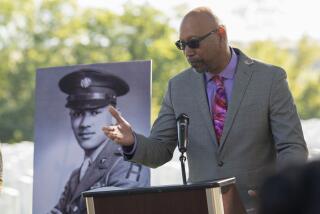150 years late or not, Civil War hero may yet get Medal of Honor
- Share via
WASHINGTON -- Alonzo H. Cushing is close to receiving the Medal of Honor, nearly 150 years after his heroic actions at Gettysburg.
A little-noticed provision of a House-approved defense bill would waive the time limit for posthumously bestowing the nation’s highest military honor, allowing the medal to be bestowed on the 22-year-old Union artillery lieutenant who died during Pickett’s charge on July 3, 1863.
If passed by the Senate and signed by President Obama, the measure would end a decades-long struggle by a 92-year-old resident of Cushing’s native Wisconsin.
“I’m glad that it’s finally happening,’’ Margaret Zerwekh said by phone from Delafield, where she lives on land once owned by the Cushing family.
Her efforts date back to the mid-1980s, when she wrote then-Sen. William Proxmire (D-Wis.). The campaign to award the medal to Cushing has been championed by other Wisconsin lawmakers.
The 1st lieutenant’s command -- Battery A, 4th U.S. Artillery -- was at the focal point of the Confederate attack led by Maj. Gen. George Pickett at Gettysburg on the last day of the three-day battle that became a turning point in the Civil War.
Cushing’s command of about 110 men and six cannons was “right in the center’’ of the assault, John Heiser, a National Park Service historian at Gettysburg National Military Park, said in an interview.
Though seriously wounded in the shoulder and groin, Cushing continued to fight.
“By the time the [Confederate] cannonade had ended, there was only Cushing, one of his sergeants, Frederick Fuger [who later would receive the Medal of Honor] and maybe a handful of gunners. They could barely manage one gun,”’ Heiser said.
Nonetheless, Cushing moved a cannon to a wall lined with Union infantry.
“The Confederate infantry was close now. He said, ‘I’ll give them one more shot.’” As he fired the cannon, he was shot “and fell dead across the trail of the gun,” Heiser said.
A stone marker recognizing Cushing’s heroics was placed on the battlefield in 1887.
The provision that would allow Cushing to be awarded the medal was put into the defense bill at the urging of Wisconsin Reps. Ron Kind, a Democrat, and James Sensenbrenner, a Republican. Similar legislation has been pushed in the Senate by Sen. Herb Kohl (D-Wis.)
Recommendations for the Medal of Honor must be formally made within two years or three years of the action, depending on the military branch, unless Congress waives the time limits.
Whether the broader defense bill, which sets priorities for Pentagon spending, clears Congress is unclear because of controversies unrelated to the Cushing provision.
Army Secretary John McHugh in 2010 expressed support for bestowing the Medal of Honor on Cushing. Even if the legislation passes, additional approvals would be needed, including the defense secretary’s endorsement and the president’s approval.
Of 3,476 Medals of Honor that have been awarded, 1,522 were awarded for heroism during the Civil War, according to the Congressional Medal of Honor Society, made up of Medal of Honor recipients.
President Clinton in January 2001 awarded the Medal of Honor to African American Civil War hero Andrew Jackson Smith at a White House ceremony attended by Jackson’s 93-year-old daughter.
“Sometimes it takes this country a while, but we nearly always get it right in the end,”’ Clinton said, also bestowing the Medal of Honor on Theodore Roosevelt for bravery during the Spanish American War.
Congress last year ordered the Pentagon to determine whether Jewish World War I veterans were denied the Medal of Honor because of discrimination. The action came in response to a campaign led by the 82-year-old daughter of a Jewish World War I veteran.
In 1996, seven African American World War II veterans were awarded the Medal of Honor, all but one posthumously, the first such awards bestowed on blacks in the armed forces in that conflict. In 2000, 22 Asian Americans who fought in World War II were awarded the medal after a four-year review prompted by legislation.
ALSO:
Mormons steal show at Gay Pride march in Salt Lake City
Jerry Sandusky case: Judge lays down some ground rules for trial
Face transplant for “zombie” victim? Unlikely. First comes simple survival
More to Read
Sign up for Essential California
The most important California stories and recommendations in your inbox every morning.
You may occasionally receive promotional content from the Los Angeles Times.











